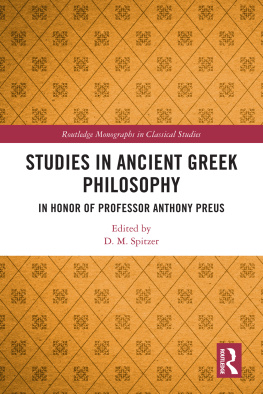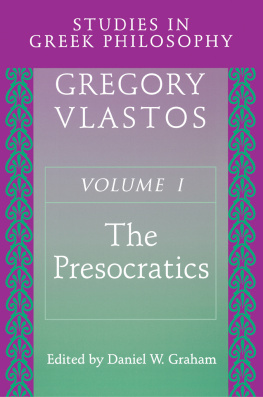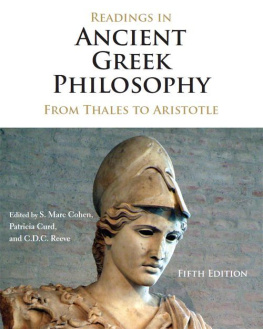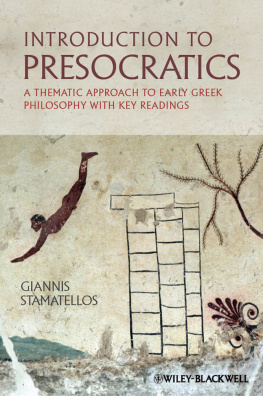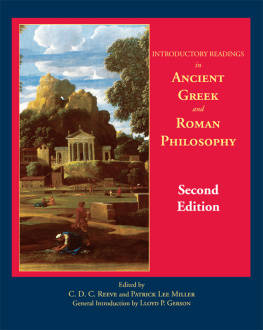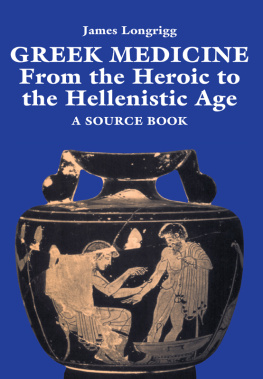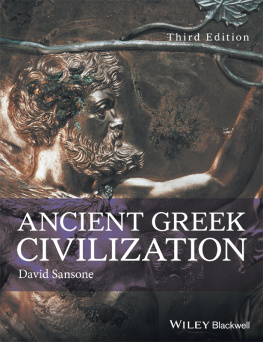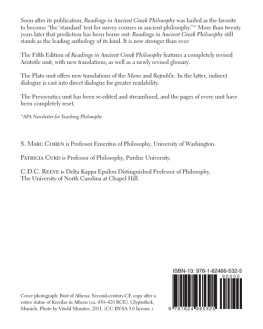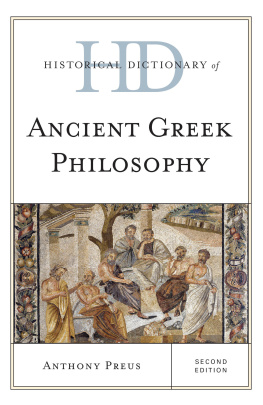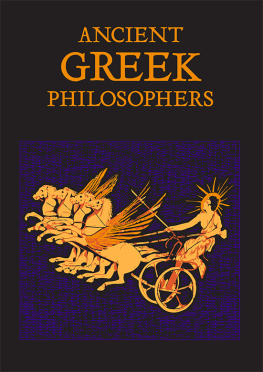This edition first published 2011
2011 Thomas A. Blackson
Blackwell Publishing was acquired by John Wiley & Sons in February 2007. Blackwell's publishing program has been merged with Wiley's global Scientific, Technical, and Medical business to form Wiley-Blackwell.
Registered Office
John Wiley & Sons Ltd, The Atrium, Southern Gate, Chichester, West Sussex,
PO19 8SQ, United Kingdom
Editorial Offices
350 Main Street, Malden, MA 02148-5020, USA
9600 Garsington Road, Oxford, OX4 2DQ, UK
The Atrium, Southern Gate, Chichester, West Sussex, PO19 8SQ, UK
For details of our global editorial offices, for customer services, and for information about how to apply for permission to reuse the copyright material in this book please see our website at www.wiley.com/wiley-blackwell .
The right of Thomas A. Blackson to be identified as the author of this work has been asserted in accordance with the UK Copyright, Designs and Patents Act 1988.
All rights reserved. No part of this publication may be reproduced, stored in a retrieval system, or transmitted, in any form or by any means, electronic, mechanical, photocopying, recording or otherwise, except as permitted by the UK Copyright, Designs and Patents Act 1988, without the prior permission of the publisher.
Wiley also publishes its books in a variety of electronic formats. Some content that appears in print may not be available in electronic books.
Designations used by companies to distinguish their products are often claimed as trademarks. All brand names and product names used in this book are trade names, service marks, trademarks or registered trademarks of their respective owners. The publisher is not associated with any product or vendor mentioned in this book. This publication is designed to provide accurate and authoritative information in regard to the subject matter covered. It is sold on the understanding that the publisher is not engaged in rendering professional services. If professional advice or other expert assistance is required, the services of a competent professional should be sought.
Library of Congress Cataloging-in-Publication Data
Blackson, Thomas A.
Ancient Greek philosophy : from the Presocratics to the Hellenistic philosophers / Thomas A. Blackson.
p. cm.
Includes bibliographical references (p.) and index.
ISBN 978-1-4443-3572-9 (hardcover : alk. paper) ISBN 978-1-4443-3573-6 (pbk. : alk. paper) 1. Philosophy, Ancient. I. Title.
B171.B53 2011
180dc22
2010039900
A catalogue record for this book is available from the British Library.
This book is published in the following electronic formats: ePDFs 9781444396072;
ePub 9781444396089.
In memory of my brother, Gary Lee Blackson (4/21/5911/9/01). He was wonderful.
In gratitude to my children, Wyatt Dashiell and Jarrett Lee. May they find a better way than their father and his brother.
Preface
I wrote this book for students in the ancient philosophy course required for a philosophy major in most American universities. In the case of my students, it had become clear that they were not satisfied with the traditional anthologies. The same was true for the newer, topically organized anthologies. The ancient texts are difficult to understand, and the anthologies contain little explanation.
The situation got worse when I supplemented the anthologies with some of the standard scholarly works. These works are narrowly focused, either on a period within the history or on a specific text, and my students found such detailed analysis difficult if not impossible to comprehend because so much of it presupposed a general understanding of ancient philosophy.
In the beginning, I failed to see a solution. It is impossible to give the necessary explanation in lecture, and this would not be desirable even if it were possible. Students are not interested in spending all their time taking notes. Most of them want to listen and think about the material as it is presented, and many want to be part of a discussion. For this to work, they must have explanations to consult outside class. And when I first thought about the form these explanations might take, I failed to appreciate the full range of possibilities. I thought that every form would suffer from the problem Julia Annas ascribes to those surveys that run through a selection of works of some great ancient thinkers in chronological order. In her anthology, she says that we are now suspicious of these narratives and that a single authoritative narrative, particularly one that takes the student past a selection of Great Thinkers, is false to the spirit of ancient philosophy itself because [p]hilosophy in the ancient world was typically characterized by discussion and debate, and by an awareness of alternative points of view
In thinking more about the problem, I realized that the surveys Annas has in mind represent only one attempt to provide the necessary explanation. Instead of surveying the ancient philosophical tradition, I realized that it would be better to focus on the development of certain key lines of thought within the tradition. This approach would avoid the problem that plagues the anthologies and the surveys Annas has in mind. These works have limited value because they do not show how the selected texts belong to, and are manifestations of, the various lines of thought that push the ancient philosophical tradition forward. A series of brief discussions that takes the student past a selection of Great Thinkers is unlikely to provide any insight into the history of philosophy.
It is true, as Annas notes, that ancient philosophy was typically characterized by discussion and debate and an awareness of alternative points of view, but this does not entail that every form of what one might term a single narrative is unacceptable. Arguments in philosophy rarely occur in isolation, and the arguments in the ancient philosophical tradition are no exception. The ancients constructed their arguments within the context of certain relatively continuous lines of thought, and only against this background can the student begin to understand what these philosophers thought and hence why certain interpretations of the texts are more plausible than others.
Since Socrates is the central figure in so much of the ancient philosophical tradition, my focus in this book is on lines of thought that in one way or another pass through him. I do not provide exhaustive philosophical and historical analyses of the texts that form these lines of thought. Nor do I catalogue and discuss the strong and weak points of even the most important alternative interpretations. Such extended and detailed analysis is the province of the traditional scholarly works. Similarly, I make little or no attempt to explain how different focuses would emphasize different lines of thought within the ancient philosophical tradition. In my opinion, there should be narratives that emphasize lines of thought I do not emphasize. There should also be narratives that provide different interpretations of the texts I connect into lines of thought. These narratives, I believe, would go a long way toward making ancient philosophy a little easier to appreciate for the fascinating and beautiful subject it is. I hope this book is a step in that direction, but I am aware that the task is enormous and that my talents in the history of philosophy are limited.
I do not assume my discussion eliminates the need to read the works of the ancient philosophers. On the contrary, I intend this book to be read in conjunction with extended selections from their writings. I include translations of some of the most fundamental texts in the lines of thought I feature in this book, but it is necessary to read the context in which these texts occur. The traditional anthologies are helpful in this regard, and nowadays many older translations are available on the internet. The Perseus Digital Library ( http://www.perseus.tufts.edu/hopper/ ) is especially valuable. It provides both translations and Greek texts, as well as many other helpful resources. The MIT Internet Classics Archive ( http://classics.mit.edu/ ) also provides translations, some of which, in the case of Aristotle for example, are not currently available in the Perseus Digital Library .


